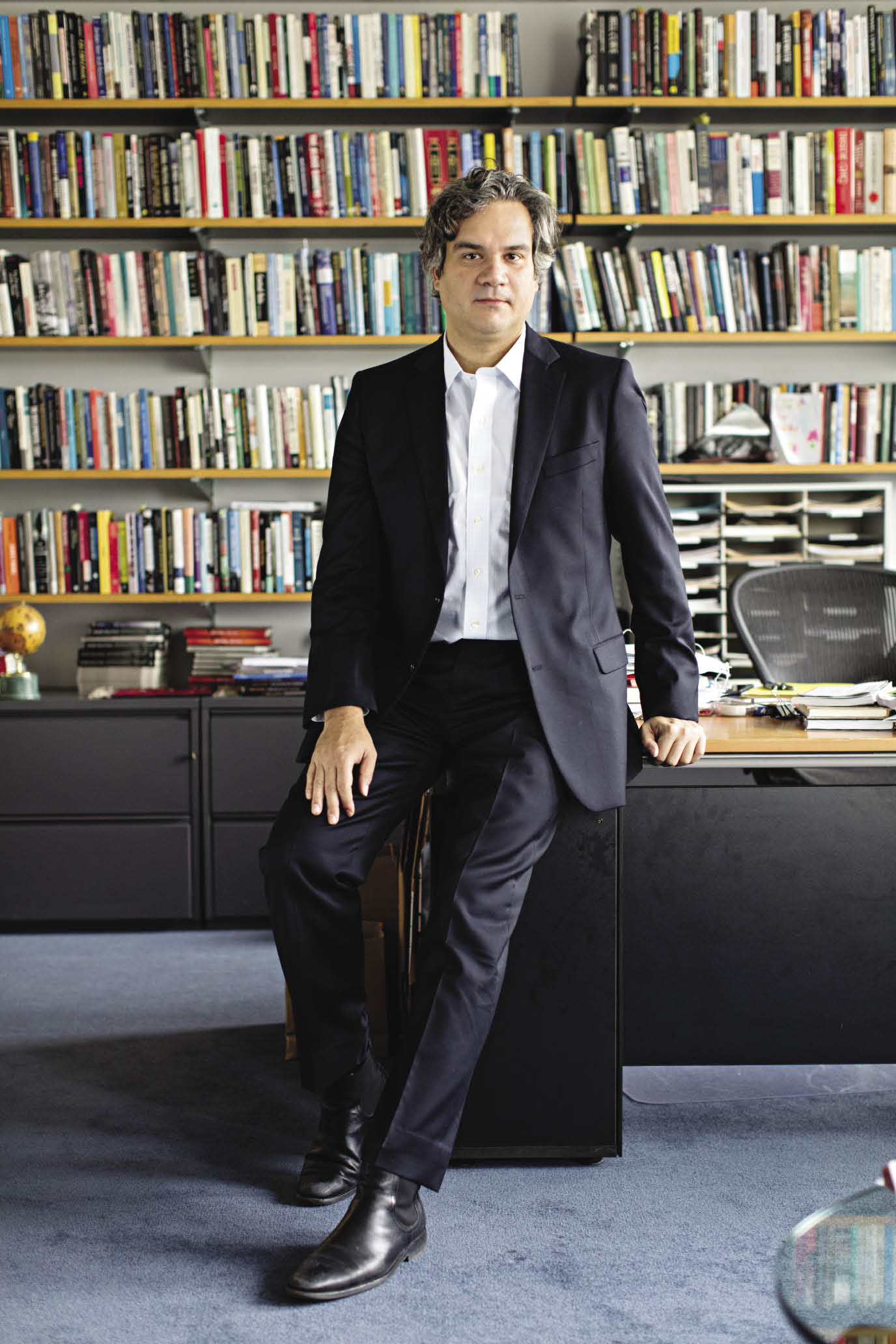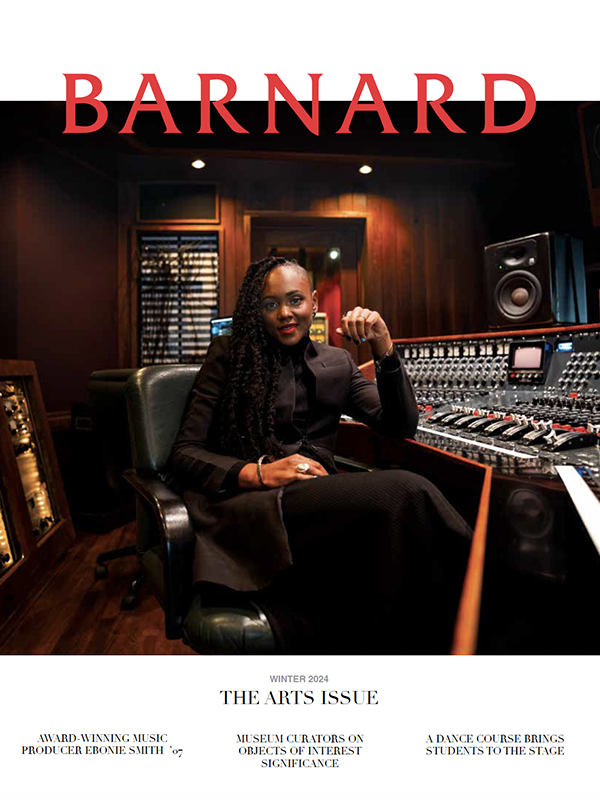Ever since Nicole Edwards ’18 arrived at Barnard, she has immersed herself in the study of Russia. “I took Russian language my first semester at Barnard and Russian literature in the spring,” says Edwards. “I fell in love with both of these classes in just one week.” Since then, she’s surrounded herself with Russian speakers at Barnard and Columbia, and spent a semester at the Liden & Denz Intercultural Institute of Languages in St. Petersburg. The Russian regional studies major plans to spend her junior year studying in St. Petersburg and Moscow; she’s interested in working at the U.S. Department of State or the U.S. Embassy in Moscow.

In December, she heard about a new five-year BA/MA in Russian, Eurasian, and Eastern European studies offered by the Harriman Institute at Columbia University. The new degree is just one of many initiatives being carried out by the Harriman Institute’s new director, Professor Alexander Cooley, former chair of Barnard’s political science department.
“I think we need to strengthen our outreach to undergraduates by introducing the idea of regional studies at an earlier point in their academic careers,” says Cooley. Cooley received his master’s and PhD from Columbia and has been a faculty member at Barnard since 2001, teaching such classes as “International Relations of a Post-Western World.”
Formerly deputy director for social sciences programming at the institute, he took the reins as director on July 1, 2015, and is the first director whose expertise is not purely Russian. His research centers on how external organizations and entities influence the development and sovereignty of former Soviet states, specifically in Central Asia and the Caucasus.
First founded in 1946 as the Russian Institute, the institute has undergone two name changes, becoming the W. Averell Harriman Institute for the Advanced Study of the Soviet Union in 1982, and, 10 years later, the Harriman Institute.
Since 1991, the question has been: What comprises the region being studied? “Is it just Russia? Is it Russia and the former Soviet states? We decided to make it as broad as possible,” says Cooley.
The director first became interested in Central Asia in the mid-’90s as a PhD student writing his dissertation on the impact of international aid on the Kyrgyz political system. He spent a semester doing field research and taught at the American University in Kyrgyzstan (now the American University of Central Asia). Since then, he has regularly returned to the region for research, including for his 2012 book Great Games, Local Rules: The New Great Power Contest in Central Asia , which examined the struggle for influence in the region among Russia, China, and the United States.
As director of the Harriman Institute, Cooley says he plans to build upon “the excellent foundations” of his predecessors. Former Harriman Institute director Timothy Frye, Marshall D. Shulman Professor of Post-Soviet Foreign Policy at Columbia, says that Cooley has experience leading a bureaucracy, having served as chair of Barnard’s political science department. “This is very helpful because there are about a dozen staff members at Harriman. We also run many events, so management skills are important,” says Frye.
Alla Rachkov ’98, associate director of the Harriman Institute, says Cooley understands that not all students want to pursue an academic track, and seeks to prepare them to take jobs outside academia. Part of that effort includes the five-year BA/MA degree offered to Barnard students and undergraduates at Columbia. The Harriman Institute’s executive committee approved the idea in 2014 while Cooley was a member. “Alex is determined to make the program a reality, which I think is going to be a huge benefit for undergraduate students,” says Rachkov. “A bachelor’s degree does not carry the weight that it used to, and more employers want to see a master’s degree with a strong foundation behind it.”
The institute already offers a two-year master of arts in regional studies—Russia, Eurasia and Eastern Europe and a Harriman Institute Certificate for those pursuing other degrees at Columbia.
Edward Tyerman, term assistant professor in the Slavic department at Barnard and Columbia and a faculty member at the Harriman Institute, says the program, which begins this fall, allows students “to convert their undergraduate degree into a higher qualification that will deepen their understanding of the region and make them more attractive to employers.”
Tyerman says the Slavic department and the Harriman Institute have historically had “a very strong relationship,” with the late chair of the department, longtime Barnard professor Catharine Nepomnyashchy, a former director of the institute.
Anastasiya Moroz ’17, a European studies and Russian language and literature major, says she plans to apply. A native of Ukraine, Moroz was already considering a master’s degree in Russian-area studies. “This program is perfect because I can finish a year earlier,” she says. “With the crisis in Ukraine and the deteriorating relationship between Russia and the West, it is a perfect time to study the area.”
In addition to the new degree, Cooley wants the Harriman Institute to partner with a broad range of disciplines and professional schools to examine timely issues. “Whether it be a debate about Russian propaganda in the media at the journalism school or the use of UK courts by Russian companies in the law school, I want us to join hands and encourage work and professional development in the region.”
Cooley notes those who receive a Harriman degree have more career options than they did 30 years ago. “In the ’70s and ’80s, students sought out jobs in the U.S. government,” Cooley says. “Today there are more opportunities for work in the non-governmental sphere such as consulting groups, international finance, think tanks and nonprofit organizations.”
Cooley, who teaches “Legacies of Empire & the Soviet Union” at the Harriman Institute, says he noticed an increase in class size this year, going from about 12 to 18 students. He explains that when the Cold War ended and the Soviet Union collapsed, there was an assumption among universities that “we would move from studying regions to a globalization of the area. I think what we see now with the crisis in the Ukraine and the adversarial relationship between the United States and Russia is a real demand for regional expertise and knowledge,” he says, adding, “Crisis always triggers a need for specialists.”
With the 70th anniversary of the institute approaching, plans are in the works to conduct an oral history of the Harriman Institute. A number of events in 2016 will also mark the 25th anniversary of the collapse of the Soviet Union. The following year the focus will be on the 100th anniversary of the Russian Revolution.
Cooley also hopes to strengthen ties between the institute and the numerous Eurasian diaspora groups and cultural centers in the New York area, along with Eurasian communities in New York City. “Really, the goal is to make the institute a dynamic, vibrant hub for scholarship, debate, and the exchange of difficult ideas,” says Cooley, whose term as director ends in June 2018. “I want to break from the mold of having the institute be relevant only in times of conflict in the region.” •
